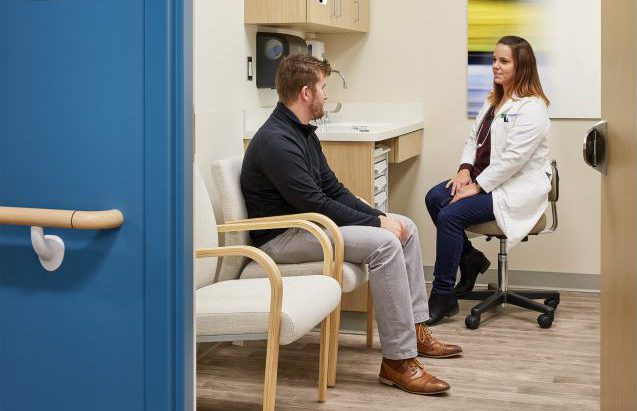Head and Neck Cancer
Head and neck cancers grow in your mouth, throat, sinuses, nasal cavity and salivary glands. They can affect activities you do every day, like swallowing and talking, which makes specialized care crucial.
At St. Elizabeth Healthcare, we’re committed to helping you achieve the best possible outcome. Our head and neck cancer specialists customize your care to meet your specific needs. Advanced diagnostics and cutting-edge treatments lead to high-quality, effective care. And cancer support services offer help for your entire healthcare journey.
What You Should Know About Head and Neck Cancer
Head and neck cancers are twice as common in men than in women. They account for about 4% of all cancers in the U.S. Doctors diagnose head and neck cancers more often in people over age 50. Cancer cells usually begin in the skin that lines the mouth, throat and nasal cavity. They are known as squamous cell carcinomas.
Our team diagnoses and treats head and neck cancers, including:
Head and Neck Cancer Symptoms
Head and neck cancers can cause pain or affect important functions like swallowing and talking. While each person can have different symptoms, some of the most common include:
- Frequent nosebleeds.
- Lump on neck or face.
- Pain in the neck or throat.
- Pain when swallowing.
- Pain when speaking.
- Patch of white or red skin inside the mouth.
- Swelling under the chin or jawbone.
- Sinus swelling, blockage or an infection that doesn’t improve.
- Trouble breathing or speaking.
- Voice changes.
If you experience these symptoms, please talk to your primary care provider or dentist. Early diagnosis and treatment of head and neck cancer lower your risk for long-term problems.
Reduce Your Risk of Head and Neck Cancer
People who use tobacco and alcohol have a higher risk of head and neck cancers. Stopping tobacco use, including smoking, vaping and chewing, can reduce your risk.
Oral HPV infections can also increase your risk of head and neck cancers. The HPV vaccine Gardasil® can help prevent head and neck cancers in people ages 9 through 45.
If you are at high risk for head and neck cancer, your doctor may recommend screening. During this test, your provider looks for cancer before symptoms occur.
Cancer found early might be easier to treat. Your provider will talk with you about which screening tests they recommend and when you should have them. If a screening test result is abnormal, they’ll speak with you about the next steps, including any additional diagnostic tests you may need.
Genetic Testing for Head and Neck Cancer
Our team understands that a cancer diagnosis comes with many questions — including “How did this happen?” and “Is my family at greater risk?” Our certified genetic counselors are here to help answer those questions.
Our hereditary cancer program offers information and resources on inherited cancers. Genetic testing can help identify if your family is at risk due to inherited genetic mutations. This can also help us to develop treatment plan focused on your case.
We recommend genetic counseling if you have a family history of cancer or are diagnosed with head and neck cancer. Genetic counseling provides important information to you and your family about cancer risk, risk reduction and prevention.
Diagnosing Head and Neck Cancers
Many people with head and neck cancer receive a diagnosis after experiencing a symptom that won’t go away. The most common symptoms include a hoarse voice, affected speech, difficulty or painful swallowing or a lump in the neck. If you or a loved one are experiencing these symptoms for longer than a few days, it’s time to talk to your provider.
We offer state-of-the-art diagnostic imaging to precisely diagnose head and neck cancers, including
Head and Neck Cancer Treatments
Doctors treat head and neck cancer in several ways. Your personalized treatment plan will depend on your diagnosis, the type of cancer and its stage. We also consider how the treatment will affect your speech, movement and breathing. We often use a combination of multiple treatments to give you the best outcomes.
Your treatment options may include:
Head and Neck Cancer Surveillance
You can count on the St. Elizabeth Cancer Center team to be there for you throughout your cancer journey — diagnosis, treatment or survivorship. We are here for all your questions and concerns — and to give you the peace of mind that your care is in expert hands.
Routine screening is a proven method to detect cancer or recurrence early. Our comprehensive surveillance schedule meets your unique medical needs and can include:
- Follow-up visits.
- Genetic counseling.
- Occupational therapy.
- Physical therapy.
- Specialist appointments.
- Speech therapy.
- Support group recommendations.
Certified oncology data specialists maintain and update important treatment data. We use this database to gather vital information, stay on top of trends, measure the effectiveness of different treatments and gauge cancer’s impact on our community.



